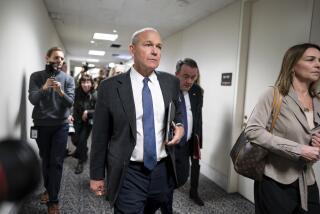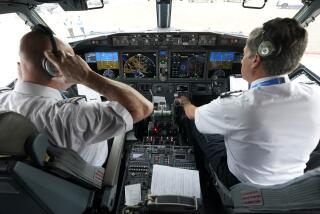Depressed pilots may fly with medication, FAA says
- Share via
Pilots taking antidepressants will be permitted to fly after U.S. regulators dropped a decades-old ban on four drugs.
Risks from side effects such as drowsiness that are associated with the medications used to treat depression don’t pose a safety threat, the Federal Aviation Administration said Friday.
“We have a better understanding of the drugs,” FAA Administrator Randy Babbitt said. “We know more about the illness, we know more about how to treat it.”
The policy, which goes into effect Monday, may cover as many as 10,000 pilots, said Fred Tilton, the federal air surgeon.
Organizations led by the Aircraft Owners and Pilots Assn., which represents 415,000 small-plane pilots, and the Air Line Pilots Assn., the largest union for commercial cockpit crews, had sought to lift the restriction. The FAA said its action was consistent with the views of the groups.
“We really need to remove the stigma, if you will, of being treated for an illness,” Babbitt said.
The FAA decision reflects extensive study of the medication issue, said Bill Voss, president of the nonprofit Flight Safety Foundation in Alexandria, Va.
“The FAA knows this is going to be a controversial ruling because of the stigma attached to depression,” Voss said. “I’m sure they doubly did their homework.”
Under the policy, pilots can seek FAA permission to take one of four drugs -- Eli Lilly & Co.’s Prozac, Pfizer Inc.’s Zoloft or Forest Laboratories Inc.’s Celexa or Lexapro. Prozac, Zoloft and Celexa have lost patent protection and are available in generic form.
All four drugs are in a class of antidepressants called SSRIs, which help regulate mood by blocking reabsorption of the chemical serotonin, believed to play a role in behavior. The drugs give the brain access to more serotonin.
FAA policy bans pilots from flying if they have depression because the condition can be distracting in the cockpit and pose a safety risk, according to the agency. Under the new policy, pilots with depression can seek treatment with one of the four medications and keep flying.
Steven Chealander, a former American Airlines captain and National Transportation Safety Board member, called the policy a “big deal” for pilots who would face disqualification because they take antidepressants.
“A lot of guys I know for various reasons haven’t been able to get their medical” certificate because of health conditions or prescriptions, said Chealander, now a vice president of training for Airbus in Miami. “You’ve got to be in such good medical condition.”
An estimated 20 million people in the U.S. have depression, which can cause thoughts of suicide, sadness and feelings of worthlessness, according to the National Institutes of Health. Pilots who show success controlling their depression for 12 months using one of the medications will be able to seek permission to fly.
More to Read
Inside the business of entertainment
The Wide Shot brings you news, analysis and insights on everything from streaming wars to production — and what it all means for the future.
You may occasionally receive promotional content from the Los Angeles Times.










